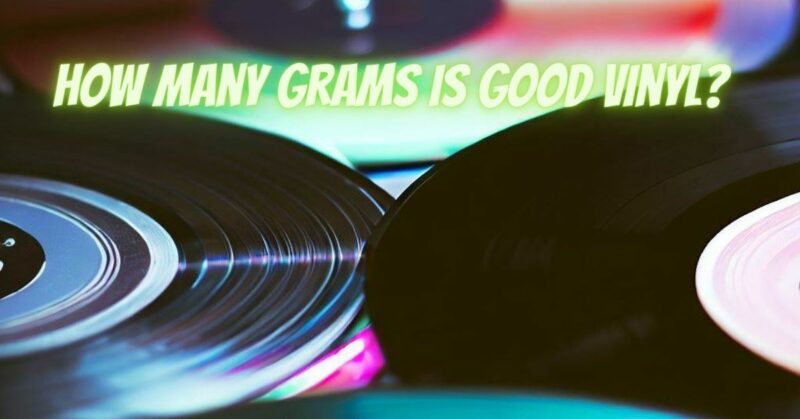The world of vinyl records is a diverse landscape, offering enthusiasts a range of options to explore. Among the factors that influence vinyl’s sound quality and durability, the weight of the vinyl itself plays a significant role. In this article, we delve into the question of how many grams is considered “good” for vinyl records, examining the impact of vinyl weight on sound quality and the factors to consider when choosing the right weight for your collection.
Decoding Vinyl Weight
Vinyl records are categorized by their weight, typically measured in grams per square inch (gsm) or grams per record (g). The standard weight for most vinyl records falls within the range of 140-180g. This weight refers to the mass of the vinyl used to create the record.
The Influence of Vinyl Weight on Sound Quality
The weight of vinyl records can influence their sound quality in several ways:
- Stability during Playback: Heavier vinyl records, such as those in the 180g category, are less prone to warping and offer improved stability during playback. This stability can lead to reduced surface noise and improved tracking.
- Potential for Better Sound Quality: Some enthusiasts believe that heavier records can provide better sound quality due to factors like improved pressing consistency and reduced resonance. However, other aspects, such as mastering and pressing quality, also significantly impact sound.
- Groove Depth and Dynamic Range: Heavier vinyl records might allow for deeper grooves, potentially increasing the dynamic range and capturing more audio detail.
Considering Other Factors
While vinyl weight is a notable consideration, it’s important to remember that it’s not the sole determinant of sound quality:
- Mastering Quality: The quality of the audio mastering plays a vital role in sound quality. A well-mastered record will sound good regardless of its weight.
- Pressing Quality: The precision of the pressing process affects how well the audio is transferred onto the vinyl. A well-pressed lighter record can offer excellent sound quality.
- Playback Equipment: The quality of your turntable, tonearm, cartridge, and stylus significantly impacts the overall sound experience.
- Groove Density: The density and depth of grooves, as well as the overall mastering quality, have a more substantial impact on sound than vinyl weight alone.
Choosing the Right Weight for You
When choosing vinyl records, consider the following:
- Personal Preference: Your preferences as a listener play a significant role. Some people enjoy the tactile feel of heavier records, while others prioritize sound quality.
- Collectibility: Heavier records are often associated with special editions and collector’s items, adding to their appeal for collectors.
- Playback Conditions: If your turntable and tonearm are well-calibrated, they can accommodate various vinyl weights effectively.
The weight of vinyl records is a complex factor that intersects with various aspects of sound quality and collection preferences. While heavier vinyl records might offer potential advantages in terms of stability and possible sound quality improvements, it’s not the sole determinant of a vinyl record’s sonic performance. As you explore the world of vinyl, keep in mind that the beauty of the format lies in its unique characteristics and the rich musical experiences it offers, regardless of the number of grams it weighs.


